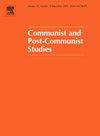东方又红了!共产主义和俄罗斯的幽灵如何塑造中欧和东欧对中国的看法
IF 1.3
4区 社会学
Q3 INTERNATIONAL RELATIONS
引用次数: 1
摘要
在过去的十年里,中国迅速成为中东欧的主要参与者。它会分裂欧洲吗?这些前共产主义国家会再次与东部的共产主义超级大国结盟吗?还是他们过去对俄罗斯和共产主义的经历引起了对中国的怀疑?本文探讨了2020年秋季对六个中东欧国家(捷克共和国、匈牙利、拉脱维亚、波兰、塞尔维亚和斯洛伐克)的民意调查数据,可以告诉我们中东欧对中国态度的驱动因素。这表明,中国已经成为俄罗斯之外的“第二东方大国”,许多中东欧国家的人已经将自己定义为反对俄罗斯。尽管中东欧公众对中国的看法存在很大差异,但个人对东方或西方的自我认同,以及对共产主义过去和当今共产主义的态度,始终塑造着俄罗斯和中国的看法。俄罗斯在中东欧所有国家中都显得举足轻重,但对拉脱维亚和波兰来说尤其如此,他们对中国的看法似乎完全是通过对其庞大的俄罗斯邻国的态度来调和的。最后,我们思考了这些关于中东欧对华舆论结构的发现对“16+1”机制的未来以及更广泛的中东欧-中国关系的影响。本文章由计算机程序翻译,如有差异,请以英文原文为准。
The East Is Red…Again! How the Specters of Communism and Russia Shape Central and Eastern European Views of China
During the past decade, China has rapidly emerged as a major player in Central and Eastern Europe (CEE). Will it divide Europe? Might these formerly communist countries align themselves again with a communist superpower to their east? Or does their past experience of Russia and communism generate suspicions of China? This article explores what public opinion data from a fall 2020 survey of six CEE countries (the Czech Republic, Hungary, Latvia, Poland, Serbia, and Slovakia) can teach us about the drivers of CEE attitudes toward China. It suggests that China has become a “second Eastern power” beyond Russia against which many people in the CEE have come to define themselves. Although there are large differences between CEE publics in their views of China, individual-level self-identifications with the East or West, and attitudes toward the communist past and communism today consistently shape views of both Russia and China. Russia looms large for all in the CEE, but especially for Latvia and Poland, whose views of China appear to be almost completely mediated through attitudes toward their giant Russian neighbor. We conclude with thoughts on the implications of these findings about the structure of CEE public opinion toward China for the future of the “16+1” mechanism and CEE-China relations more broadly.
求助全文
通过发布文献求助,成功后即可免费获取论文全文。
去求助
来源期刊

Communist and Post-Communist Studies
Multiple-
CiteScore
1.90
自引率
0.00%
发文量
23
期刊介绍:
Communist and Post-Communist Studies is an international journal covering all communist and post-communist states and communist movements, including both their domestic policies and their international relations. It is focused on the analysis of historical as well as current developments in the communist and post-communist world, including ideology, economy and society. It also aims to provide comparative foci on a given subject by inviting comments of a comparative character from scholars specializing in the same subject matter but in different countries.
 求助内容:
求助内容: 应助结果提醒方式:
应助结果提醒方式:


